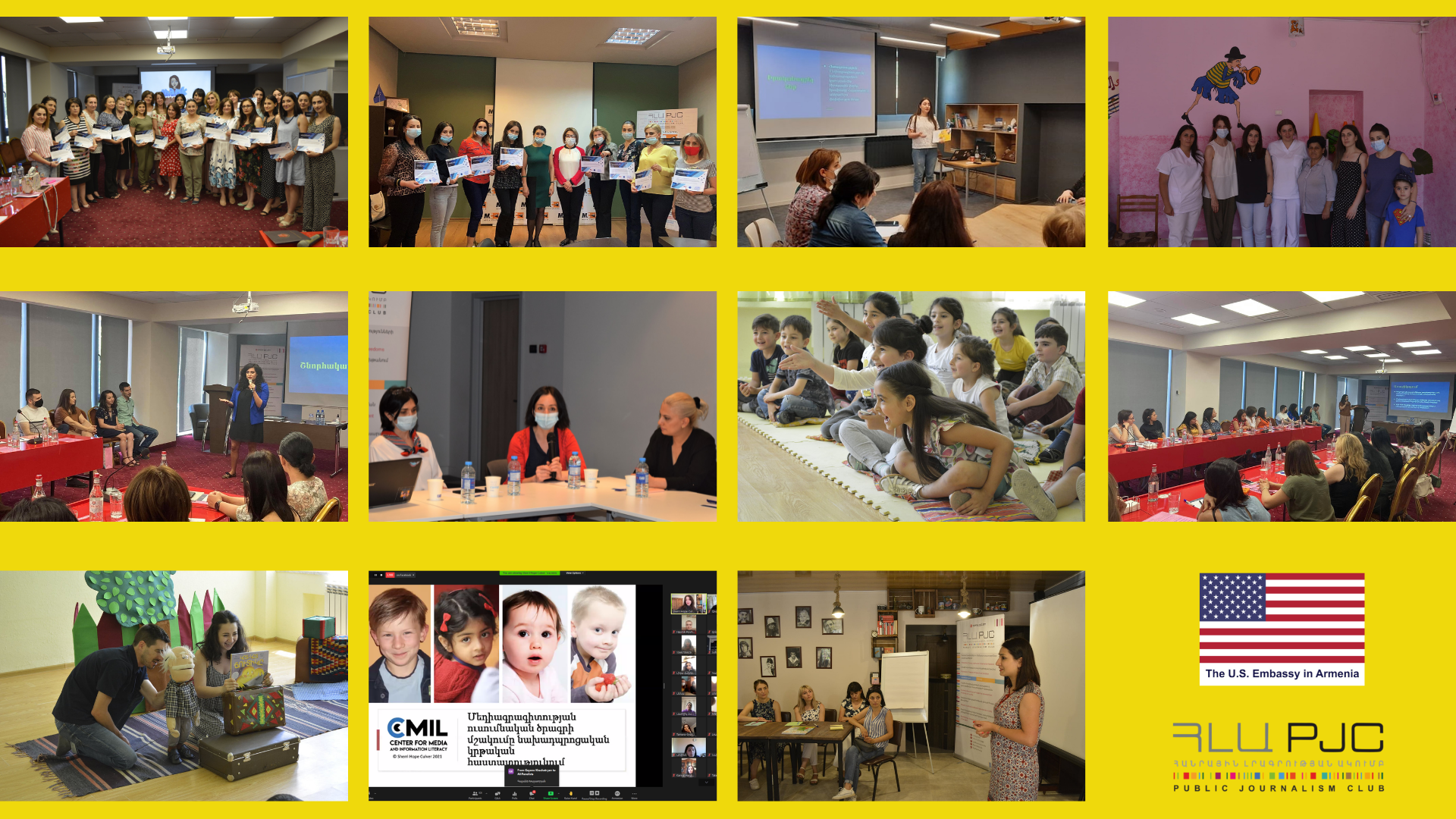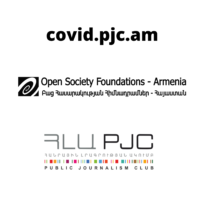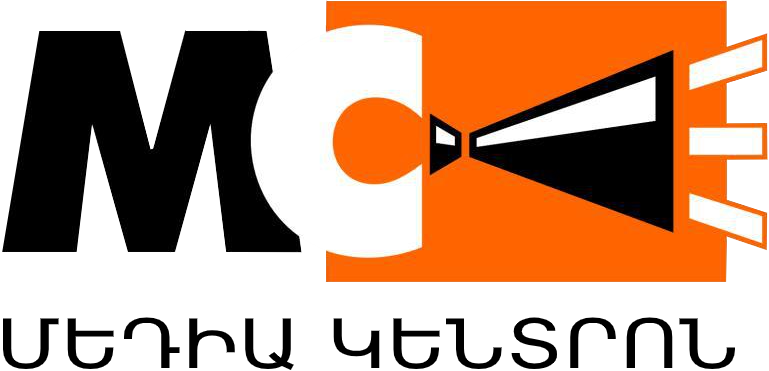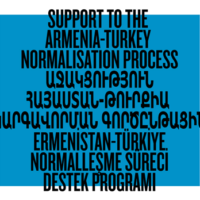
More secure online environment for preschool children
- September 9, 2021
- Category: News
“Media literacy is not just important, it’s absolutely critical. It’s going to make the difference between whether kids are a tool of the mass media or whether the mass media is a tool for kids to use”
– Linda Ellerbee, American journalist
The coronavirus pandemic became the reason that children spend more time in front of screens․ On top of that they do that alone, often encountering content that they are clueless about and that is not intended for them. In such conditions, media literacy as a vital knowledge and capacity became critical.
In September 2020, the “Public Journalism Club” NGO, with the support of the US Embassy in Armenia, launched the “Acting for Safer Online Environment: information literacy intervention for preschools” project aimed at developing critical thinking and media literacy by providing trainings to preschool teachers, preparing and publishing relevant literature and organizing different courses.
The program was launched with the “Media Literacy in Preschool Education” survey, which was conducted in from December 15 to March 15, 2020-2021. The research includes the study of the international best practice (Finland, Denmark, Sweden, Great Britain, USA), as well as the study of the situation in Armenia and a package of necessary changes.
The publication of the research was followed by a public discussion on its results and the new state standards of preschool education, which was attended by Deputy Minister of Education and Culture Zhanna Andreasyan, leading specialists of the education Department of Yerevan Municipality, professors of the Pedagogical University, educators and methodologists of Yerevan state kindergartens.
“We have taken into account recommendations related to media literacy in new standards. Everything starts with education, back from kindergarten, however we do not often see a systematic discussion, a consistent policy in this field. There were changes in the standard of preschool education. It should be noted that those changes are fundamental. We have taken into account all the changes in the standards of general education. We tried to ensure proportionality so that the transition from primary education to general education would be as smooth as possible. Digital media literacy is included in the key competences”.
– Zhanna Andreasyan
Working in a close cooperation with Senior Advisors of the Finnish National Audiovisual Institute (KAVI) Lauri Palsa and Saara Salomaa, we organized the first webinar called “Systematic Media Literacy through Participatory Policy Development – Sharing Finnish examples” on November 30, 2020.
“In the modern world, it is difficult to find a field which has nothing to do with the media. Everything starts with realizing the role of the media in people’s professional, personal and public lives. The media provides us with many opportunities”.
– Lauri Palsa
The second webinar with Lauri Palsa and Sara Salomaa took place on January 22, 2021 on the topic of “Exploring the characteristics and best practices of Finnish media education”.
The number of webinar participants exceeds 40 persons. More than 1,700 users watched each of the Facebook live broadcasts.
The speaker of the next series of webinars was American media expert Sherry Culver, who is the head of the Center for Media Literacy at Temple University, USA. Culver’s main areas of teaching and consulting are media literacy and media institutes, particularly children’s media content.
The webinar consisted of the following five topics:
- “Promoting media literacy. Exchange of US practice”.
(January 29, more than 1100 views) - “Defining media literacy and information literacy, their differences, importance of media literacy and critical thinking”. (February 19, more than 11.000 views)
- « Creative Media Literacy Practice. US experience» (February 26, more than 2400 views)
- “Development of a media literacy curriculum in a preschools” (March 5, more than1700 views)
- « Promoting media literacy best practices and accessible resources for preschools » (March 12, more than 1400 views)
We often received more than 600 applications for each of the webinars. More than 100 educators participated in each webinar.
On June 22, Sherry Culver conducted an exclusive one-day seminar on the topic of “teaching media literacy and critical thinking in early childhood education” in Yerevan.
“Literacy is the ability to read and write, and media literacy is the ability to consume media and create media content.”
– Sherry Culver
Twenty five preschool teachers, professors of ASPU, representatives of the Education Department of Yerevan Municipality had the opportunity to participate in the seminar.
“It was very interesting for me to learn about the US experience and understand how I can localize it in Armenia.”
– Tatevik Yenokyan
During her visit to Armenia Ms. Culver also visited kindergarten in Garni village of Kotayk region, to discuss with teachers the importance of media literacy and its teaching methodology.
“Media map travelers” is educational material about media and the emotions it evokes.
“Children and media” is a handbook for parents and caretakers. It tells how to make the first steps with the media, privacy and security of information, as well as the combination of media-learning-free time.
Based on handbooks, a three-day media literacy course was held for the teachers of the preschools in Yerevan, and a one-day course was held in Shirak and Armavir regions (29 persons participated in Shirak region and 14 persons participated in Armavir region).
Emphasizing the importance of children’s literature on media in the process of teaching media literacy, the Public Journalism Club acquired the copyrights of the American bestseller fairy tales “Chicken Clicking”, “The technology tail” and “Once upon a time online” and published them in Armenian. This will provide opportunity for Armenian children to learn the important rules of media literacy and digital safety that will help them avoid media pitfalls.
Three hundred copies of each book were published and distributed to the libraries of Yerevan and regions, state kindergartens, partner organizations, independent experts, and all children who participated in the puppet show staged on “Chicken Clicking”.
The presentation of that book took place on July 23, in Khnko Aper National Children’s Library in Yerevan.
In corporation with “Heqiateren” interactive travelling puppet theatre we staged a puppet show based on “Chicken Clicking” and performed it six times in Shirak Region, in Gyumri’s “Ani” Garden, in Yerevan, in the Mkhitar Sebastatsi Educational Complex, and in Khnko Aper National Children’s Library. To stage the fourth performance PJC team and “Heqiateren” puppet theatre travelled 210 km to Syunik Region to visit Kindergarten N1 of Syunik community.
On July 29, the puppet show was staged in the central library named after Hovhannes Hovhannisyan in Etchmiadzin, Armavir Region.
“The issue is very relevant. I want to express my gratitude for the quality of the performance, for explaining media literacy and its importance in an accessible and simple language to children. Educators will definitely use the methods described in fairy tales and performances in their groups”.
Director of Central Library of Etchmiadzin after Hovhannes Hovhannisyan.
We completed “Chicken Clicking” tours in Charentsavan, Kotayk Region.
More than 30 children and teachers of preschools took part at each performance. The books printed within the framework of the project and sent to different regions of Armenia to enrich the libraries of preschools.
All educational materials, manuals and webinars created during the project are available on the website www.pjc.am, as well as on social networks in all accounts of the Public Journalism Club.
The program covered the months of September 2020 to July 2021. Public Journalism Club implemented “Acting for Safer Online Environment: information literacy intervention for preschools” program with the support of the US Embassy in Armenia.





